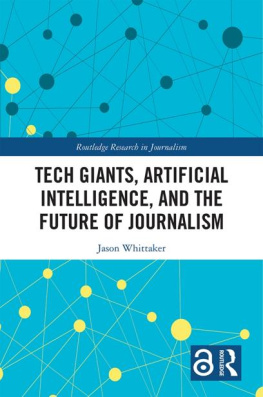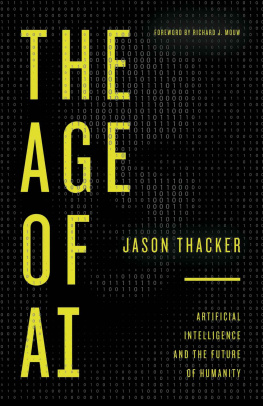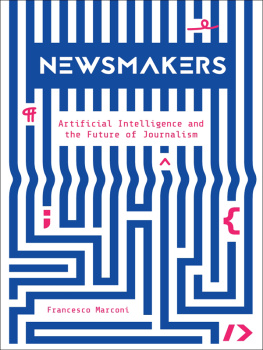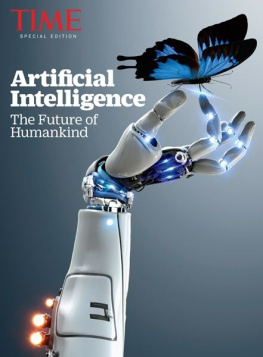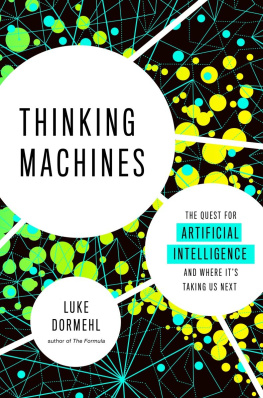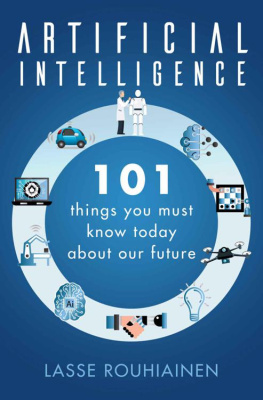Jason Whittaker - Tech Giants, Artificial Intelligence, and the Future of Journalism
Here you can read online Jason Whittaker - Tech Giants, Artificial Intelligence, and the Future of Journalism full text of the book (entire story) in english for free. Download pdf and epub, get meaning, cover and reviews about this ebook. year: 2019, publisher: Routledge, genre: Politics. Description of the work, (preface) as well as reviews are available. Best literature library LitArk.com created for fans of good reading and offers a wide selection of genres:
Romance novel
Science fiction
Adventure
Detective
Science
History
Home and family
Prose
Art
Politics
Computer
Non-fiction
Religion
Business
Children
Humor
Choose a favorite category and find really read worthwhile books. Enjoy immersion in the world of imagination, feel the emotions of the characters or learn something new for yourself, make an fascinating discovery.
- Book:Tech Giants, Artificial Intelligence, and the Future of Journalism
- Author:
- Publisher:Routledge
- Genre:
- Year:2019
- Rating:3 / 5
- Favourites:Add to favourites
- Your mark:
- 60
- 1
- 2
- 3
- 4
- 5
Tech Giants, Artificial Intelligence, and the Future of Journalism: summary, description and annotation
We offer to read an annotation, description, summary or preface (depends on what the author of the book "Tech Giants, Artificial Intelligence, and the Future of Journalism" wrote himself). If you haven't found the necessary information about the book — write in the comments, we will try to find it.
Tech Giants, Artificial Intelligence, and the Future of Journalism — read online for free the complete book (whole text) full work
Below is the text of the book, divided by pages. System saving the place of the last page read, allows you to conveniently read the book "Tech Giants, Artificial Intelligence, and the Future of Journalism" online for free, without having to search again every time where you left off. Put a bookmark, and you can go to the page where you finished reading at any time.
Font size:
Interval:
Bookmark:
This book examines the impact of the Big Five technology companies Apple, Google, Amazon, Facebook, and Microsoft on journalism and the media industries. It looks at the current role of algorithms and artificial intelligence in curating how we consume media and their increasing influence on the production of the news.
Exploring the changes that the technology industry and automation have made in the past decade to the production, distribution, and consumption of news globally, the book considers what happens to journalism once it is produced and enters the media ecosystems of the Internet tech giants and the impact of social media and AI on such things as fake news in the post-truth age.
The audience for this book are students and researchers working in the field of digital media, and journalism studies or media studies more generally. It will also be useful to those who are looking for extended case studies of the role taken by tech giants such as Facebook and Google in the fake news scandal, or the role of Jeff Bezos in transforming The Washington Post.
Jason Whittaker is the Head of the School of English and Journalism at the University of Lincoln. He worked for 15 years as a tech journalist and has written extensively on magazine journalism and digital media, most recently as the co-editor of the collection Online Journalism in Africa (2013) and as the author of Magazine Production (2016).
Routledge Research in Journalism
19 News of Baltimore
Race, Rage and the City
Edited by Linda Steiner and Silvio Waisbord
20 The Trump Presidency, Journalism, and Democracy
Edited by Robert E. Gutsche, Jr.
21 Russias Liberal Media
Handcuffed but Free
Vera Slavtcheva-Petkova
22 Critical Perspectives on Journalistic Beliefs and Actions
Global Experiences
Edited by Eric Freedman, Robyn S. Goodman, and Elanie Steyn
23 Economic News
Informing the Inattentive Audience
Arjen van Dalen, Helle Svensson, Anotinus Kalogeropoulos, Erik Albk, Claes H. de Vreese
24 Reporting Humanitarian Disasters in a Social Media Age
Glenda Cooper
25 The Rise of Nonprofit Investigative Journalism in the United States
Bill Birnbauer
26 Tech Giants, Artificial Intelligence, and the Future of Journalism
Jason Whittaker
For more information about this series, please visit: https://www.routledge.com
First published 2019
by Routledge
52 Vanderbilt Avenue, New York, NY 10017
and by Routledge
2 Park Square, Milton Park, Abingdon, Oxon OX14 4RN
Routledge is an imprint of the Taylor & Francis Group, an informa business
2019 Taylor & Francis
The right of Jason Whittaker to be identified as author of this work has been asserted by him in accordance with sections 77 and 78 of the Copyright, Designs and Patents Act 1988.
The Open Access version of this book, available at www.taylorfrancis.com, has been made available under a Creative Commons Attribution-Non Commercial-No Derivatives 4.0 license. No part of this book may be reprinted or reproduced or utilised in any form or by any electronic, mechanical, or other means, now known or hereafter invented, including photocopying and recording, or in any information storage or retrieval system, without permission in writing from the publishers.
Trademark notice: Product or corporate names may be trademarks or registered trademarks, and are used only for identification and explanation without intent to infringe.
Library of Congress Cataloging-in-Publication Data
CIP data has been applied for.
ISBN: 978-1-138-49997-3 (hbk)
ISBN: 978-1-351-01375-8 (ebk)
Typeset in Sabon
by codeMantra
To Sam for her patience and support
This book has developed over a series of discussions with a number of colleagues, students, and friends who have had the patience to sit through presentations and debates on various aspects covered in this book over the years. I would particularly like to thank Deborah Wilson-David, John Cafferkey, Ola Ogunyemi, Hayes Mabweazara, John Cafferkey, Gary Stevens, Rob Brown, and Julia Kennedy, as well as Eleanor Simmons and Felisa Salvago-Keyes at Routledge who helped to develop this book from initial idea through to final publication.
In August 2018, financial reporters around the globe became extremely excited at news that the tech company Apple had passed the $1 trillion mark in terms of its market capitalisation, the value of all its shares at that time. The BBC announced that it was the first public company worth $1 trillion, remarking that its shares had risen by more than 50,000 with some $800 billion or approximately the size of Italys stock market in 2017 being wiped off its shareholder value. Incredible drops in oil prices, combined with plans to move towards alternative sources of power in China and a clampdown on excessive swings in Chinese stocks in the aftermath of the 2007 global financial crisis demonstrated the fragile nature of such high-risk speculation.
It is no accident that a book on tech giants, artificial intelligence and journalism begins not with innovation and ideas but with the effect of share prices. In the business world, the value of the major technology companies is extremely significant news and, in many quarters, reporting about technology is synonymous with financial journalism. In March 2017, Fortune ran a piece that is typical.
Table I.1 Top ten valued companies in 2017
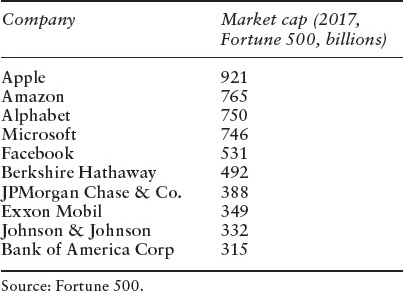
Although Walmart dominated the Fortune 500 in terms of revenue (alongside petrochemical companies, energy conglomerates, and even car manufacturers), it was tech firms that held the top spots in terms of their overall market value. In the first decade of the twenty-first century, the highest valued companies were energy giants such as Exxon Mobil, PetroChina, Gazprom, Royal Dutch Shell, and BP. and medicine, or indeed a resurgence of energy in alternative forms to gas and oil, could see a revolution in the capitalisation of companies, but to all intents and purposes, the 2010s have been the decade of the Big Five.
This brief excursion into the financial status of contemporary technological companies is one means of emphasising the significance of big tech. Nor should it be forgotten).
Table I.2 Value of top tech companies versus top media companies
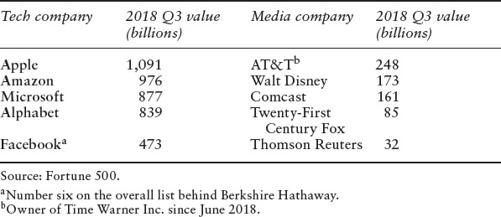
The message is clear: with the exception of Disney, flush with the success of the Star Wars franchise among other elements, AT&T and Comcast (which both have extensive telecommunications components as part of their business) the larger, more traditional media companies lag behind the main tech companies by a factor of at least ten. The companies on the right of the aforementioned chart are responsible Just over a decade later, it is the Big Five who are the subject of this book that, increasingly, control access to the new ecologies of media distribution in the twenty-first century.
Big tech is a phrase that will recur frequently in this book, and is often associated with the Big Five (Alphabet/Google, Amazon, Apple, Facebook, and Microsoft) although it is not entirely synonymous with Dont be evil as a reminder of what not to turn into.
Font size:
Interval:
Bookmark:
Similar books «Tech Giants, Artificial Intelligence, and the Future of Journalism»
Look at similar books to Tech Giants, Artificial Intelligence, and the Future of Journalism. We have selected literature similar in name and meaning in the hope of providing readers with more options to find new, interesting, not yet read works.
Discussion, reviews of the book Tech Giants, Artificial Intelligence, and the Future of Journalism and just readers' own opinions. Leave your comments, write what you think about the work, its meaning or the main characters. Specify what exactly you liked and what you didn't like, and why you think so.

